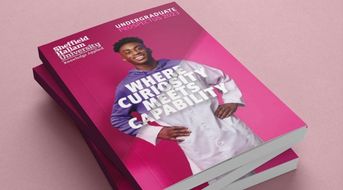Everything you need to know...
-
What is the fee?
Home: £9,250 per year
-
How long will I study?
1 Year
-
Where will I study?
-
What is the UCAS code?
2W6Q
-
When do I start?
September 2024
Employability
100% of our graduates are in work or further study fifteen months after graduating (2020/21 Graduate Outcomes Survey).
Course summary
- Expand your foundation degree knowledge to support children, young people and families in a range of professional settings.
- Study strength-based approaches and develop skills to work with families with multiple and complex needs.
- Enhance your inter-professional collaboration skills for roles in diverse contexts.
- Share learning experiences with other students through reflective discussions.
- Develop your research, digital and employability skills further.
On our one-year full-time BA (Hons) top-up degree you will build on the knowledge you’ve gained from a relevant foundation degree, graduating with a full degree and increasing your level of employability. You’ll explore key contemporary topics while further developing your skills; preparing to drive social change and empowerment for the children, young people and families you’ll be working with.

Come to an open day
Visit us to learn more about our gold-rated teaching and why we were awarded the highest possible rating in the Teaching Excellence Framework.
How you learn
All our courses are designed around a set of key principles based on engaging you with the world, collaborating with others, challenging you to think in new ways, and providing you with a supportive environment in which you can thrive.
On this course we promote both active and independent study. You’ll deepen your skills, knowledge and understanding of inter-agency collaboration. You will be ready for roles in a variety of professional contexts and diverse group work settings.
We’re a team of supportive, dedicated professionals from a range of relevant backgrounds. The modules are designed to further develop your understanding of the principles, skills and knowledge you’ll need to work with children, young people and families.
You’ll experience a blended approach to learning and teaching, both on campus and online; which mirrors how you’ll work in practice.
You learn through:
- Seminars, workshops and tutorials
- Academic adviser meetings
- Problem-based activities
- Skills development sessions
- Scenario-based learning and library support
- Guest lectures and online international events
- Collaborative and self-directed learning
- Groupwork
- Employer-led learning
- Peer support and critical reflective supervision
- Written and oral assessments
- Creative research project
Course topics
Our BA Working with Children, Young People and Families course is compliant with the Hallam Model; embedding a person centred approach to your professional knowledge, skills and behaviours in practice.
You’ll explore a range of topics, for example; strength-based approaches to safeguarding, how to support families with multiple and complex needs, and continue to develop professional competence. The course uses inclusive approaches to learning and teaching which value diversity. You’ll use real-world examples and learn from practitioners and people with lived experience.
You’ll also further develop your creative research and enquiry skills while exploring the high-quality research undertaken at Hallam and beyond. You’ll have opportunities to develop your abilities in identifying and using evidence, using methods that enhance your critical reasoning and reflection skills.
Course support
You’ll be supported in your learning journey towards highly skilled, graduate-level employment through a number of key areas. These include:
- Access to our unique student support triangle to help with your personal, academic and career development
- Access to our Skills Centre with one to ones, webinars and online resources, where you can get help with planning and structuring your assignments
- Individual and group course support from academic advisers, a research supervisor and colleagues
- Reinforcement and enhancement of writing and study skills covered in prior study
- Activities to build transferable and employability skills, reflecting on your own experiences and learning
Course leaders and tutors
Student View
Watch student Nazma Liaqat talk about the FdA/BA Working with Children, Young People and Families courses at Sheffield Hallam University.
Applied learning
Field trips
Field trips are an important way to support our approach to applied learning, helping you understand the wider context of your learning and providing an insight into working practice. We endeavour to provide opportunities for these both locally and globally to develop your confidence, competence and understanding of the sector.
As a department we value the importance of learning from diverse experiences – broadening your professional understanding and becoming a culturally competent practitioner. Through access to the Turing Grant Scheme we have a range of active partnerships across Africa, Europe and India, facilitating volunteering visits to community development or refugee agencies.
Networking opportunities
We have extra-curricular career-focused activities including; careers and job fairs, employer events, volunteering awards, leadership awards and training to assist with professional development. As a department we celebrate international social work/community work with a global audience, so you’ll be able to engage in a range of online international activities and events.
Our student Social Work and Social Care Society, our Global Majority Student Group and the Diverse Voices Conference are great opportunities for students to come together and share experiences with their peers and academic staff. Colleagues with lived experience and employer partners enhance your student experience and create real links to practice.
Future careers
We work closely with Hallam’s careers service to provide integrated and timetabled employment support throughout the course. This covers a range of career opportunities with local, regional and national employers.
Previous graduates of this course have gone on to work in:
- Family support and early intervention (local authority and voluntary sector)
- Educational settings in schools, colleges and pupil referral units (PRUs)
- Social work/social care and health settings (local authority and voluntary sector)
- Community development and outreach
- Probation, police and legal settings
After graduating you’ll also be able to access a range of postgraduate courses. In the past these have included:
- PG Cert in Teaching (primary or secondary)
- MA Social Work
- MA Applied Human Rights
- MSc Child, Adolescent and Family Mental Health
- MSc Adult Nursing
- MA Youth & Community Work
Where will I study?
You study at Collegiate Campus through a structured mix of lectures, seminars and practical sessions as well as access to digital and online resources to support your learning.
Collegiate campus
Collegiate Campus can be found just off Ecclesall Road, a bustling student district.
Collegiate Campus map | Campus facilities

Collegiate library
Collegiate Library can be found just off Ecclesall Road. It's open 24 hours a day, every day.
Learn moreEquipment and facilities
On this course you’re based at our Collegiate Crescent campus which includes:
- Our £13 million purpose-built Robert Winston Building
- Specialist facilities, including a courtroom and simulated spaces
- A 24-hour library and learning centre
- Virtual learning environments
- Online databases and search tools
- Online apps and platforms that support collaborative learning
- Electronic tools and platforms for academic and professional work
- Employment-based databases and client-record systems
Learn more about your department
Health and Social Care Facilities Tour
Learn what it's like to study health and social care at our Collegiate Campus from our adult nursing student Alex.
Entry requirements
All students
We will offer flexibility on our usual entry requirements for clearing applicants. Please call us on 0330 024 6390 to discuss your options and apply.Additional information for EU/International students
If you are an International or non-UK European student, you can find out more about the country specific qualifications we accept on our international qualifications page.
For details of English language entry requirements (IELTS), please see the information for 'All students'.
Modules
Important notice: The structure of this course is periodically reviewed and enhanced to provide the best possible learning experience for our students and ensure ongoing compliance with any professional, statutory and regulatory body standards. Module structure, content, delivery and assessment may change, but we expect the focus of the course and the learning outcomes to remain as described above. Following any changes, updated module information will be published on this page.
Final year
Compulsory modules
Becoming A Cypf Practitioner
Creative Research Skills Cypf
Safeguarding Cypf Through A Strength Based Lens
Supporting Families With Multiple And Complex Needs
Fees and funding
Home students
Our tuition fee for UK students starting full-time undergraduate study in 2024/25 is £9,250 per year. These fees are regulated by the UK government and are therefore subject to changes in government policy.
If you are studying an undergraduate course, postgraduate pre-registration course or postgraduate research course over more than one academic year then your tuition fees may increase in subsequent years in line with Government regulations or UK Research and Innovation (UKRI) published fees. More information can be found in our terms and conditions under student fees regulations.

Financial support for home/EU students
How tuition fees work, student loans and other financial support available.
Additional course costs
This link allows you to view estimated costs associated with the main activities on specific courses. These are estimates and, as such, are only an indication of additional course costs. Actual costs can vary greatly depending on the choices you make during your course.
Additional costs for Social work courses (PDF, 331.7KB)Legal information
Any offer of a place to study is subject to your acceptance of the University’s Terms and Conditions and Student Regulations.






